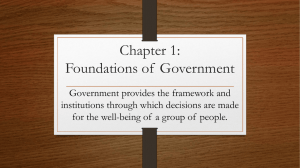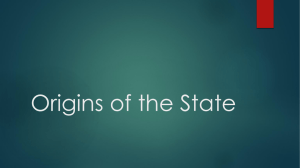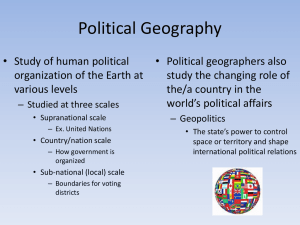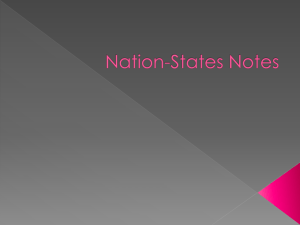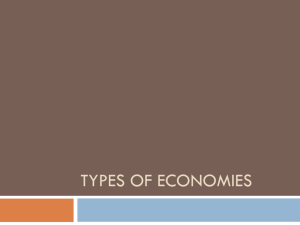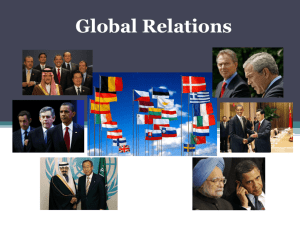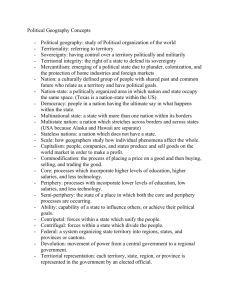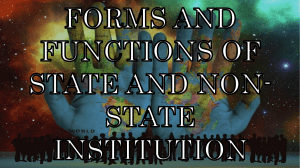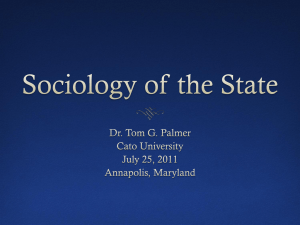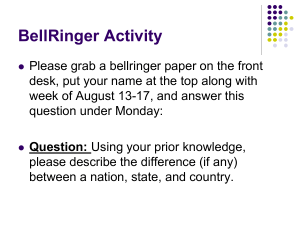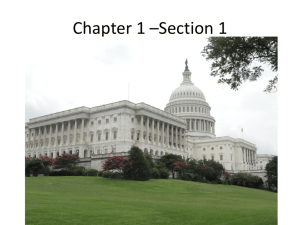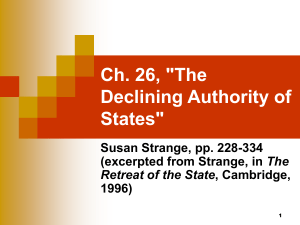World History/ Geo October 26th, 2015
advertisement
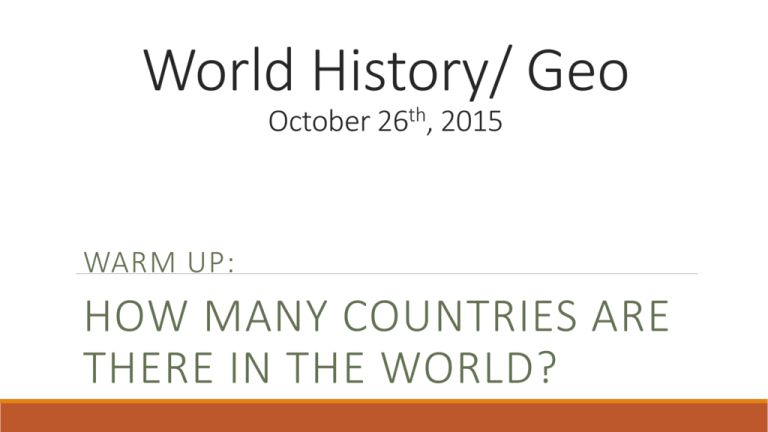
World History/ Geo October 26th, 2015 WARM UP: HOW MANY COUNTRIES ARE THERE IN THE WORLD? How many States in the World Today? (State=Country) 196 What is a Nation? •A nation is a group of people who share the same culture, language, institutions, religion, and history—usually a group of people larger than a tribe or community. •When a nation of people has an independent State of their own it is often called a nation-state. •The Kurds are a nation without a State, but France, Germany, and Japan are examples of nation-states. Nation State •system of organization in which people with a common identity live inside a country with firm borders and a single government. •determines what language we speak, what laws we follow, and what holidays we celebrate. 8 Characteristics of a State •Defined Territory • Permanent population • Economic system • Social system •Transportation system • Government • Sovereignty • Recognized by other States Defined Territory “customary international law's definition of ‘statehood' requires that a putative state have clear boundaries.” established territorial boundaries The size of the territory may change due to the acquisition or secession of land through political negotiations, purchase agreements, or by being overtaken by force such as during a war. Permanent Population •A group of people living within the same defined geographic area over time will have common cause •A state must have a population which may be variable in size. • Populations may or may not share general political beliefs but the ones that do are the most stable. •Mobility of the population can affect its political and governmental stability. Economic System A system of production and exchange of goods and services as well as allocation of resources in a society. The type of economy is determined by the extent of government involvement in economic decision making. • Free market - Private ownership of property/resources - Profit - Competition - Consumer sovereignty - Individual choice • Command economy - Central ownership of property/resources - Centrally-planned economy - Lack of consumer choice • Mixed economy - Individuals and businesses as decision makers for the private sector - Government as decision maker for the public sector - A greater government role than in a free market economy - Most common economic system today Social System •the patterned series of interrelationships existing between individuals, groups, and institutions and forming a whole •National identity • Culture • Language • Beliefs • Values • Education • Health care Transportation System •transportation network for moving goods and people Government • Government allows the state to establish social order, provide public services, and to make decisions that affect the living conditions of all people living within the territorial boundaries of the state. • Purposes: • form a more perfect union • establish justice • insure domestic tranquility • provide for the common defense • promote the general welfare • secure the blessings of liberty Sovereignty •the full right to govern itself without interference by external entities •The state has no legal responsibility to any higher authority unless it voluntarily enters into treaties creating such obligations Recognition recognition from other independent states Territories: •Are Not States - No Sovereignty •An area of land under the jurisdiction of a ruler or state. •an organized division of a country that is not yet admitted to the full rights of a state •Examples: –Hong Kong –Greenland –Puerto Rico –Parts of United Kingdom: • England, Scotland, Wales, Northern Ireland Stateless Nations •An ethnic group, religious group, linguistic group or other cohesive group which is not the majority population in any nation state. •Palestinians- most well known example od a stateless nation in conflict with Israel over territory • Negotiations for a permanent settlement stalled and Palestinian/Israeli conflict continues •Kurds- About 20 million people live in Kurdistan-which covers 6 states • Since the 1991 Iraq War, Kurdish Security Zone has been virtually independent Nation States Nation States
